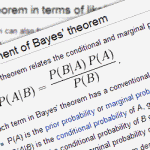Richard Carrier’s Deeply Flawed Argument To Show God Is Unlikely
by Dr. William M. Briggs
Filed under The Existence of God
In the comment section to an earlier piece of mine on Strange Notions, Richard Carrier invited me to “interact” with him through his article “Neither Life nor the Universe Appears Intelligently Designed”, found in The End of Christianity, edited by John W. Loftus. This article is the “interaction” Carrier requested. I apologize for its delay.
Introduction
Richard Carrier’s argument to show that God probably didn’t create the universe, and therefore He probably doesn’t exist, in Carrier’s “Neither Life nor the Universe Appears Intelligently Designed”, like many attempts to use probability in defense of atheism or theism, is invalid and unsound, and based on fundamental misunderstandings of who God is and of the proper role of probability.
It is also a maddening, rambling screed, little more than bluff, bluster, and bullying, as well as an endless source of egotistical phrases, pace “critics know (and when honest, admit)”, “what any rational person would conclude”, “everyone else who’s rational and sane”, and “no rational person can honestly believe”. Nevertheless, let us “set aside ignoramuses who don’t know what they’re talking about and don’t even try to know” and analyze his main errors (it would take a monograph to examine every mistake).
His argument, repeated in different contexts, is essentially this. If God did not exist, life, the universe, and everything in it (including our minds) would look just the way they do. But if God exists, He could have created life, the universe, and everything in innumerable ways and, Carrier conjectures, surely not in the fractured, imperfect, pain-guaranteeing way we see. Therefore, because “the probability that a ‘designing’ god exists but never intelligently designed anything is likewise virtually zero, since by definition that’s also not how such a god behaves” and for other reasons Carrier creates, it is likely God does not exist.
The first and last parts are pure bluff. We have no idea what a “designing god” would do for a living, nor what the universe would look like had God not created it. To say we do assumes we have (absent God) an explanation of why there is something rather than nothing, which we do not have. Note carefully that “something” includes quantum fields, the “laws” of the universe, mathematics, anything you can think of. To say we know what the universe would look like had God not created it, is to claim one knows precisely why whatever physical, mathematical, mental, and philosophical foundations exist, exist the way they do, without circularly drawing on those foundations for their explanation. And that is impossible.
The second part is bluster. Call it the Carrier-as-God thesis, which essentially reads like this: “If I, Carrier the god, were to design the universe, it would be pink and happy with ‘bodies free of needless imperfections’. Since the Christian God obviously did not create this delightful world, he must not exist.” But how can Carrier presume to know why God did what He did? Carrier never explains.
The last part is bullying, probabilistic persiflage. Carrier thinks that by thumping the reader with (unnecessary, as it turns out) mathematics that science is happening, and thus nothing else need be said.
Carrier’s Main Argument
Carrier first defines “nonterrestrial intelligent design”:
“By ‘intelligent design,’ I mean design that is not the product of blind natural processes (such as some combination of chance and necessity), and by ‘nonterrestrial,’ I mean neither made by man (or woman) nor any other known life-form.”
Anything that happens by necessity must happen; necessary events are determined, i.e. caused, to happen in the way they did.
But nothing happens because of chance: chance is measure of knowledge and not a cause; it is not an ontological force and thus cannot direct events. Chance cannot be creative, though necessity, which implies design, is creative by definition. “Natural processes” cannot therefore be “blind.”
God is not a “life-form”. He nowhere takes up physical residence, nor does He live amorphously in some outer reach of the universe. God is not a creature, nor is He the same as the universe. In his inadequately described “designing god”, it’s clear Carrier doesn’t understand he is rejecting a god classical theologians also reject. Carrier’s god is not the ground of being, He whose name is I Am, existence itself, a necessary being who sustains all creation in each and every moment. Carrier’s god is instead a smart, long-lived creature possessed of fancy toys, perhaps made of pasta, who occasionally likes to tinker with bits and pieces of the universe but who is subject to the wiles and rules of the universe like other beings, though perhaps not to the same extent, an extent which Carrier always left vague.
Bayes' Theorem
Carrier then introduces Bayes' probability theorem, but only as a club to frighten his enemies and not as a legitimate tool to understand uncertainty. Bayes’ theorem is a simple means to update the probability of a hypothesis when considering new information. If the information comes all at once, the theorem isn’t especially needed, because there is no updating to be done. Nowhere does Carrier actually need Bayes and, anyway, probabilistic arguments are never as convincing as definitive proof, which is what we seek when asking whether God exists.
Here's a simple illustration. Suppose we accept the prior evidence (a proposition) "A standard deck of 52-playing cards, from which only one card will be pulled, and only one of which is labeled eight-of-clubs" and we later learn that "Jack removed the Jack-of-hearts from the deck." Conditional on these facts, we want the probability of the proposition, "I pull out an eight-of-clubs." This probability is obviously 1/51 whether we start with the first proposition and update with the second using Bayes, or just take both propositions simultaneously. Incidentally, this example highlights the crucial distinction that all probability is conditional on evidence which is specifically stated (there is no such thing as unconditional probability).
The problem is that Carrier artificially invents for himself various sets of “prior” information which he later tries to update using Bayes. Just like in the cards example, nowhere did he actually need Bayes for any of his arguments. Carrier further shows he misunderstands his subject when he says, “Probability measures frequency”. This is false: probability measures information, though information is sometimes in the form of frequencies, as in our card example. Suppose our proposition is, “Just two-thirds of Martians wear hats, and George is a Martian.” Given that specific evidence, the probability “George wears a hat” is 2/3, but there can be no frequency because, of course, there are no hat-wearing Martians.
Probability Errors
There is more than ample evidence Carrier is confused about the difference between probabilistic and philosophical argument. Here are some examples.
In order to form his priors, Carrier says the frequency of observed designed universes “is exactly zero.” A statement which, of course, assumes what he wants to prove, a classic error in logic, an error he duplicates when he insists he knows “full well” that intelligent extraterrestrials must, somewhere or at some time, exist. In both places, Carrier has substituted his desire for proof.
Again, “Yet any alien civilization selected at random will statistically be millions or billions of years more advanced [at designing life than we are].” Which alien civilizations are we selecting “at random”? What proof beyond conjecture and desire is there that (a) any other alien civilization exists and (b) that if any does exist it will be technologically and “statistically” more advanced than we, and that (c) even if they are more advanced, they would want to use their technological prowess to build lifeforms? This statement is nothing but an unproven science-fiction argument from desire. There is no set of premises which all can agree on that would allow us to deduce a probability here.
Carrier then writes:
“You cannot deduce from ‘God exists’ that the only way he would ever make a universe is that way. There must surely be some probability that he might do it another way. Indeed, the probability must be quite high, simply because it’s weird for an intelligent agent of means to go the most inefficient and unnecessary route to obtain his goals, and ‘weird’ means by definition ‘rare,’ which means ‘infrequent.’ which means ‘improbable.'”
Carrier constantly assumes he knows not only what God would do, but what various lesser gods would do. His case would have been infinitely strengthened had he given the evidence for these beliefs, rather than merely stating them.
He continues:
“Conversely, the probability that a ‘designing’ god exists but never intelligently designed anything is likewise virtually zero, since by definition that’s also not how such a god behaves.”
Who says? Has Carrier conducted a survey among deistical gods and their designing proclivities? Or is he merely assuming, without proof, that the gods must need design (maybe it scratches some intergalactic itch)? Anyway, Carrier’s god can’t create a universe (defined as everything that exists). That level of heft requires the God of infinite ability, the only way to get something from nothing.
“Hence it’s precisely the fact that God never does things like that in our observation that makes positing God as a causal explanation of other things so implausible.”
So much for miracles, then; and a rather dogmatic dismissal at that.
Design and Intelligence
Carrier misunderstands other aspects of probability, too. He appears to believe, like many, that evolution occurs “randomly” and is a “product of chance”. That’s impossible. Nothing is caused by “chance” or occurs “randomly” because chance is not a cause and neither is randomness. Chance and randomness are measures of our ignorance of causes, and are not themselves ontological realities. It is always a bluff to say that “randomness” or “chance” caused some effect. You either know the cause or you do not. If you know it, state it. If you do not, then admit it (using probability).
Intelligent design enthusiasts make the same mistake, and when they do, Carrier is there to show us, to his credit: “Michael Behe’s claim that the flagellar propulsion system of the E. coli bacterium is irreducibly complex and thus cannot have evolved”. The system’s evolution, to Behe, was completely “improbable.” Yet improbability arguments don’t work for or against evolution. If a thing has happened—and the propulsion system happened—it was caused. That we don’t know of the cause is where probability enters, but only as a measure of our ignorance of the cause. Whether we know or don’t know of the cause, there is still a cause. Things don’t “just happen.” That’s why when we see that organisms have evolved, which is indisputable, we know there must be some thing or things causing those changes.
What about the start of all life, i.e. biogenesis? Carrier says, “by definition the origin of life must be a random accident.” Thus does hope replace reality. Life could not have sprung up “randomly”, for randomness isn’t a cause. As it is, there is no direct evidence of how life arose, a gap which Carrier replaces with bluster, a science-of-the-gaps theory. I have no idea how life got here. God might have done it directly, or merely designed the system so that it had to arise. But something caused it. To say “I don’t know what the cause was” is not proof that “God was not the cause”.
How about the start of the universe? Carrier says:
“Suppose in a thousand years we develop computers capable of simulating the outcome of every possible universe, with every possible arrangement of physical constants, and these simulations tell us which of those universes will produce arrangements that make conscious observers (as an inevitable undesigned by-product). It follows that in none of those universes are the conscious observers intelligently designed (they are merely inevitable by-products), and none of those universes are intelligently designed (they are all of them constructed purely at random)...
Our universe looks exactly like random chance would produce, but not exactly like intelligent design would produce.”
Unfortunately, this isn’t even wrong. It is impossible—as in not possible, no matter what—for “random chance” to create even a mote on the speck of a quark let alone an entire universe. Anyway, how would Carrier or anybody know what a designed universe looks like? Again, no guidebook exists. To say this one isn’t designed is stunningly bold, a belief without evidence of any kind—except the desire that it not be so.
Motivations
Perhaps the following sentences reveal how Carrier so easily fooled himself: “Hence I have demonstrated with logical certainty that the truth of Christianity is very improbable on these facts. And what is very improbable should not be believed. When enough people realize this, Christianity will come to an end.” And, contradicting himself in the matter of certainty of Christianity, he later says, “Christianity is fully disconfirmed by the evidence of life and the universe.”
Carrier nowhere in the body of his argument spoke of Christianity, but only vaguely of ETs, gods, and some curious ideas of what God would act like if He were Richard Carrier. Strange, then, that he should be so confident he has destroyed all of Christianity.
And no other religion.
Related Posts
Note: Our goal is to cultivate serious and respectful dialogue. While it's OK to disagree—even encouraged!—any snarky, offensive, or off-topic comments will be deleted. Before commenting please read the Commenting Rules and Tips. If you're having trouble commenting, read the Commenting Instructions.













